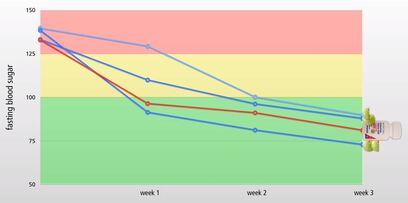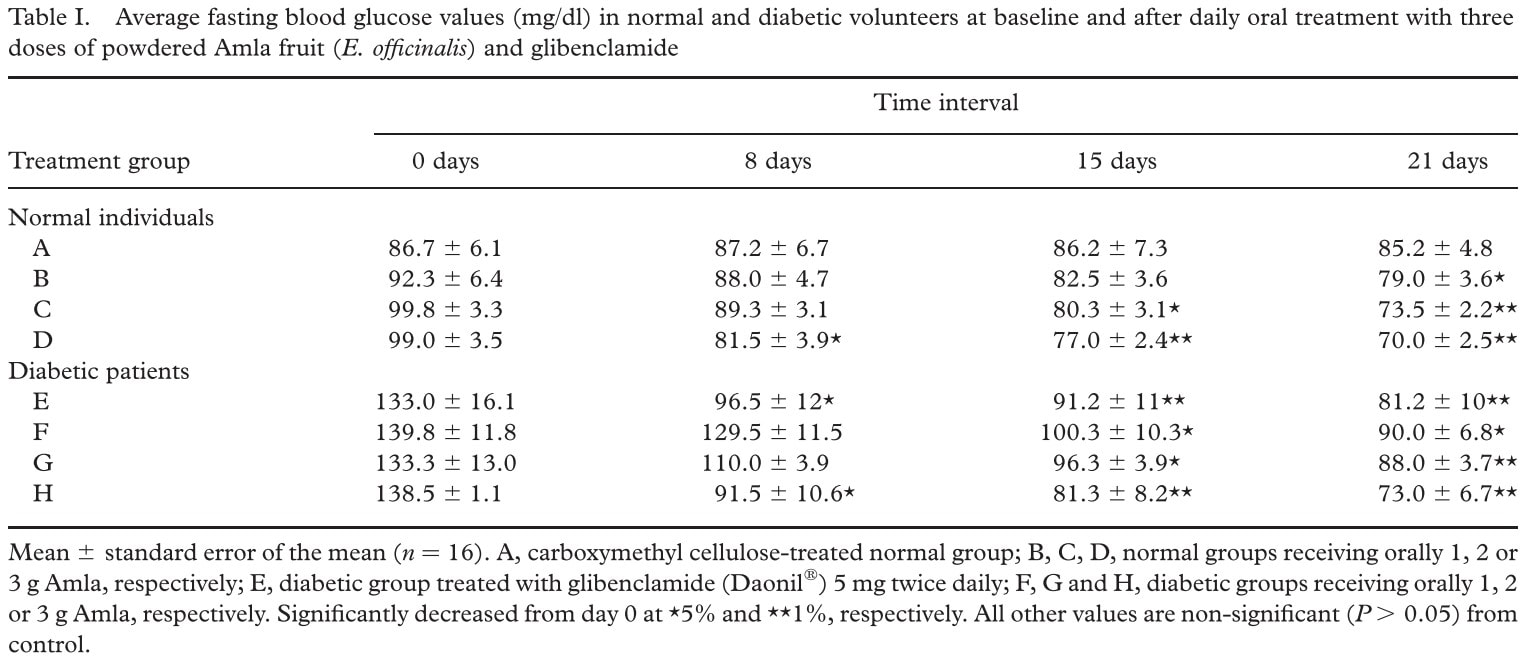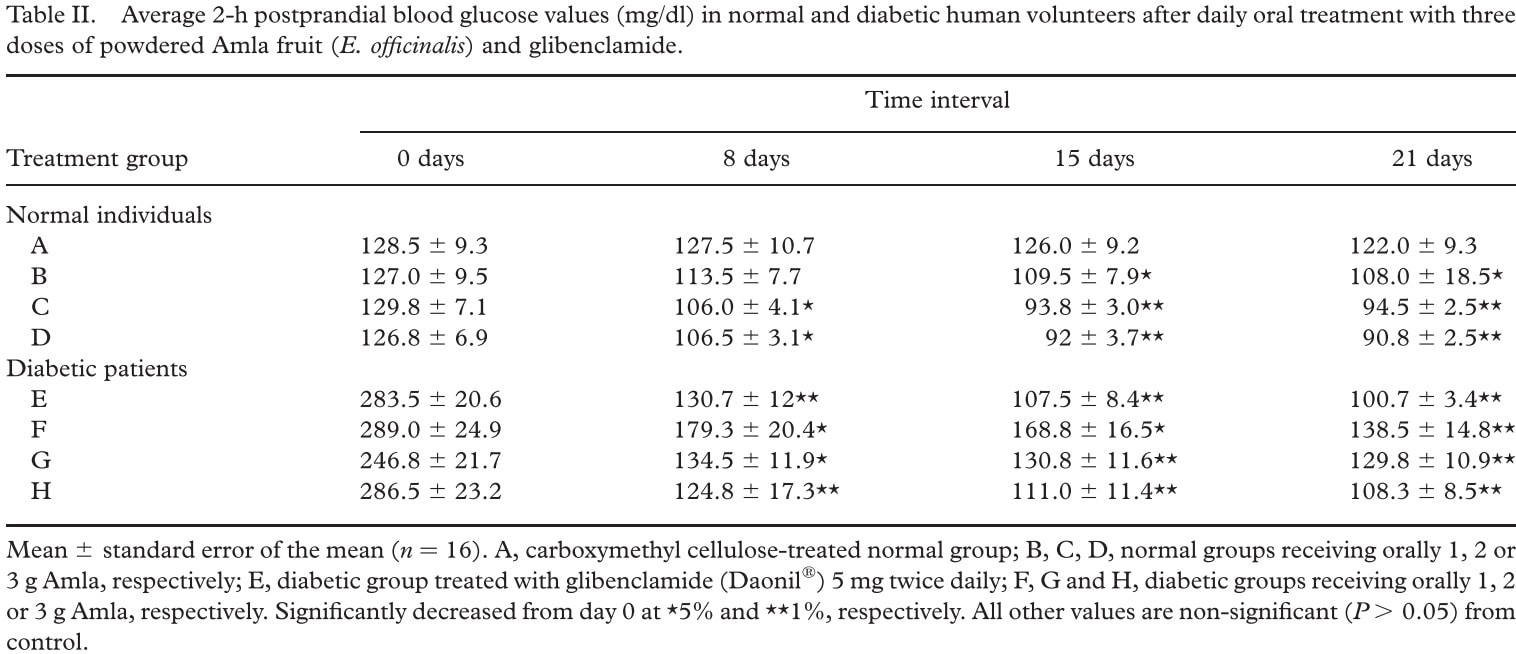 Image from Neutritionfacts.org Amla vs Diabetes Image from Neutritionfacts.org Amla vs Diabetes Fasting blood glucose (FBG) and 2 hours post meal glucose are two tools used to monitor diabetes and treatment. These tools do not tell the entire story. However, they provide valuable insight and are easy to monitor and track overtime. A small study in Pakistan compared amla powder (Indian gooseberry) to glibenclamide (glyburide). This medication belongs to a class of drugs known as sulfonylureas. One of its many functions is to stimulate the pancreas to secrete more insulin. Amla is a tart fruit used in food and as a medicine in Ayurvedic medicine. Over the last few years, several clinical trials conducted in India and Pakistan show promising result for several conditions. These include hyperlipidemia, GERD, and diabetes. The diabetic group used glibenclamide (a sulfonylurea medication) as a control. Carboxymethyl cellulose fiber served as the control for the non-diabetic group. The intervention groups received 1, 2, or 3 grams of Amla powder (Emblica officinalis) for 21 days. The researchers report a statistically significant drop in fasting blood glucose (see table 1). All the Amla groups showed significant results. Patients given 3 grams had the most dramatic improvement. They started with an average FBG of 138.5 mg/dl.. On day 21 of the study, this group’s average FBG was 73.0. The results for blood glucose 2 hours post meal (postprandial) are also impressive. All doses of amla power showed a significant decrease in blood glucose (see table 2). What are the side-effects of amla?
This same study found that amla power also lowered LDL (the “bad” cholesterol), lowered triglycerides, and raised HDL (the “good” cholesterol). What could be better? Other studies report positive preliminary results for amla as a treatment for GERD, osteoarthritis, and vertigo. However, these studies are preliminary and there is not enough data. [Warning: Do not stop or change your medication without consulting your doctor!] Even with the absence of adverse reaction in the current published literature, there is a potential for interaction with medications. For example, amla can reduce platelet aggregation. This sounds good. However, theoretically, if combined with medications with similar functions, the risk of bleeding increases. Low blood sugar (hypoglycemia) is possible when combined with medications that lower blood sugar. This is theoretical and has not been reported in human trials. Sulfonylurea medications come with their own risks. This medication forces your pancreas to secrete insulin even if you do not ingest carbohydrates. This can result in sever hypoglycemia is you do not eat enough calories and carbohydrates. Another unwanted effect is weight gain. Bottom Line: Should I take amla? Consult with your doctor! I am not saying that because doctors need more patient visits. Ingesting amla in amounts greater than that consumed as food has potential risks. These risks increase when combined with medication. Research into the medical use of amla is still ongoing. It has not been tested for long-term efficacy and safety at high doses. I use amla, in the context of a holistic treatment plan, with some patients. It is not right for everyone. In the end, amla does not defeat diabetes. For some people, it may form part of a good treatment plan. Our goal at Revive Family Medicine is to help you defeat diabetes and regain your health. A transformation of how we live our lives is at the heart of gaining victory and regaining our health. Amla is not the answer. An herb, or any medication, by itself cannot defeat diabetes. Indian gooseberry is an herbal medication that has several plant chemicals. There is an increasing amount of evidence that these chemicals help our body deal with blood sugar, cholesterol, and fat in a way that appears beneficial. References:
2 Comments
Cani Mota
11/21/2023 03:20:30 pm
I.believe doctors prefer you don't take plant based medication because they rather stick.you with prescriptions that cause harm.to.you with side affects.. I rather take my chances with the plant an i.have, therefore, am doing well with my Diabetes.
Reply
Graham James
12/17/2023 08:50:57 am
I joined TM (Trancendental meditation ) over 40 years ago and have found natural medicines far better than modern medicine. However the doctors don't like when you tell them what your taking and are do there best to put you off it. Herbal medicine should be available on the national health as many people should be able to choose for themselves.
Reply
Leave a Reply. |
AuthorWrite something about yourself. No need to be fancy, just an overview. Archives
April 2024
Categories |


 RSS Feed
RSS Feed